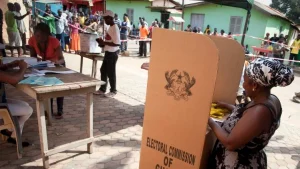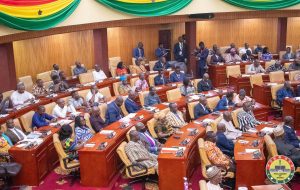President Nana Addo Dankwa Akufo-Addo has charged heads of State-Owned Enterprises (SOEs) to adopt strategies to improve the financial performance of their institutions.
He tasked them to operate profitably and efficiently and expand their scope of operations to generate employment, wealth for the people, and contribute effectively to the national development agenda.
The President gave the charge when he opened the 2022 Policy and Governance Forum, organized by the State Interests and Governance Authority (SIGA) in collaboration with the Ministries of Finance and Public Enterprises.
Since assuming office, the President said, his government had to spend a significant amount of time addressing challenges inherited from the predecessors which almost crippled the specified entities.
He mentioned some of the challenges as legacy debts, low working capital, weak corporate governance structures, and a multiplicity of stakeholder policy directives with overlapping and conflicting objectives.
Others were dispersed monitoring systems, adding that the establishment of SIGA had helped to resolve some of the concerns, even though there was room for considerable improvement.
He, however, expressed concern about the continued losses being made by some specified entities, pointing out that between 2018 and 2019, losses posted by specified entities rose significantly by some 200 per cent
with the Auditor General's report for 2020 making for difficult reading.
“Up till this time, the government is doing its best to see to the rapid growth of the economy which must bring the phenomenon of posting losses to an
end.”
“The late reporting and submitting of reports by specified entities leave a lot to be desired and undermine the efforts of the Controller and Accountant General in the presentation of a global picture for Ghana’s public finances. We have to turn over a new leaf,” President Akufo-Addo stressed.
President Akufo-Addo also urged organizations in which the state has an interest to involve indigenous micro, small and medium enterprises (MSMEs) in their direct supply chain activities.
When practiced continuously for the next five years, it would spur the growth of MSMEs, create more employment for young people and impact a lot of lives, he said.
President Akufo-Addo used the occasion to highlight the necessity to adopt the use of technology and govt’s digitization policy, stressing that Ghanaians want to see a SIGA that will assist in moving the country to a situation beyond aid, the President said.
He further urged the board members and management of SIGA to be the watchdogs in ensuring that the institutions under their jurisdictions lived up to their mandate.
President Akufo-Addo, therefore, advised them to leave their respective entities in a better position than they came to meet them.
The Minister of Public Enterprises, Mr Joseph Cudjoe, said the country had 183 public enterprises on the register, comprising 51 state-owned enterprises (SOEs), 43 joint venture companies (JVCs) and 89 other state entities (OSEs).
However, he said, a large number was yet to submit its management and audit accounts for the 2020 fiscal year.
The minister charged the leaders to turn their entities into profitable ventures by making every effort to be part of those that were working for the economic good of the country.
For his part, Mr Edward Boateng the Director-General of SIGA observed that there was lack of policy coherence among state institutions.
He said streamlining existing policies and introducing clearer ones that would help address the challenges and other legacy issues would be an important first step to sharpen operational efficiency and effectiveness of the enterprises and help secure investment.
A Deputy Minister of Finance, Dr John Kumah, said the SOEs, had consistently recorded losses from GH¢2.1 billion in 2015 to GH¢5.3 billion in 2020, with a cumulative annual growth rate of 16 percent.
As of the end of December 2021, only 31 out of 51 SOEs, 22 out of 89 OSEs and 22 out of 43 JVCs had submitted audited financial statements for 2020 to the Finance Ministry, he said.
Due to the non-compliance of the entities to submit their statements, the Finance Ministry would not consider any request for government support to any specified entity that failed to meet the reporting requirement among other sanctions.
By: Isaac Clottey








